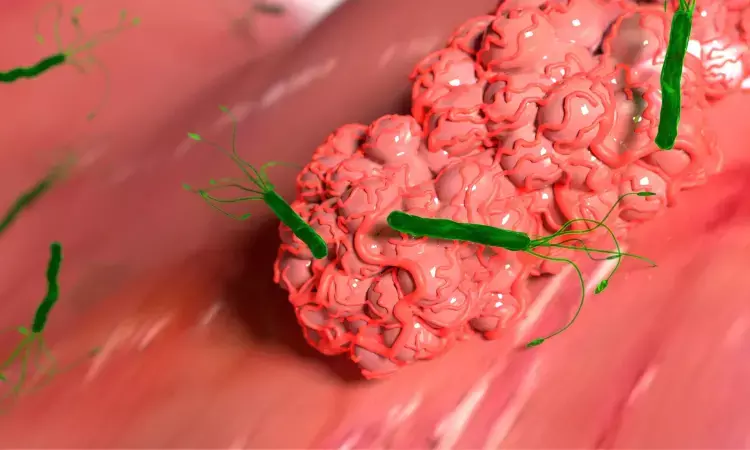- Home
- Medical news & Guidelines
- Anesthesiology
- Cardiology and CTVS
- Critical Care
- Dentistry
- Dermatology
- Diabetes and Endocrinology
- ENT
- Gastroenterology
- Medicine
- Nephrology
- Neurology
- Obstretics-Gynaecology
- Oncology
- Ophthalmology
- Orthopaedics
- Pediatrics-Neonatology
- Psychiatry
- Pulmonology
- Radiology
- Surgery
- Urology
- Laboratory Medicine
- Diet
- Nursing
- Paramedical
- Physiotherapy
- Health news
- Fact Check
- Bone Health Fact Check
- Brain Health Fact Check
- Cancer Related Fact Check
- Child Care Fact Check
- Dental and oral health fact check
- Diabetes and metabolic health fact check
- Diet and Nutrition Fact Check
- Eye and ENT Care Fact Check
- Fitness fact check
- Gut health fact check
- Heart health fact check
- Kidney health fact check
- Medical education fact check
- Men's health fact check
- Respiratory fact check
- Skin and hair care fact check
- Vaccine and Immunization fact check
- Women's health fact check
- AYUSH
- State News
- Andaman and Nicobar Islands
- Andhra Pradesh
- Arunachal Pradesh
- Assam
- Bihar
- Chandigarh
- Chattisgarh
- Dadra and Nagar Haveli
- Daman and Diu
- Delhi
- Goa
- Gujarat
- Haryana
- Himachal Pradesh
- Jammu & Kashmir
- Jharkhand
- Karnataka
- Kerala
- Ladakh
- Lakshadweep
- Madhya Pradesh
- Maharashtra
- Manipur
- Meghalaya
- Mizoram
- Nagaland
- Odisha
- Puducherry
- Punjab
- Rajasthan
- Sikkim
- Tamil Nadu
- Telangana
- Tripura
- Uttar Pradesh
- Uttrakhand
- West Bengal
- Medical Education
- Industry
14-day hybrid therapy and 10-day bismuth quadruple therapy ideal first-line treatment for H.Pylori infection

Taiwan: According to a study published in AJG, American Journal of Gastroenterology, researchers have found 14-day hybrid therapy and 10-day bismuth quadruple therapy to be more effective in treating H. pylori infection than the 14-day high-dose dual therapy as the first-line treatment.
Researchers comparatively evaluated how safe and efficacious 14-day hybrid therapy, 14-day high-dose dual therapy, and 10-day bismuth quadruple therapy are for managing H. pylori infections in the first-line treatment.
They recruited patients with relevant histories from nine centres in Taiwan and randomly assigned them in a ratio of 1:1:1 to the three aforementioned therapies. The rate of eradication of H pylori assessed in the intention-to-treat population was the primary outcome measured in the study.
The study results could be summarised as follows:
- Nine hundred eighteen patients were assigned randomly (August 2018-December 2021).
- The intention-to-treat eradication rates for 14-day hybrid therapy, 14-day high-dose dual therapy and 10-day bismuth quadruple therapy were 91.5%, 83.3% and 90.2%, respectively.
- Both hybrid therapy (difference: 8.2%) and bismuth quadruple therapy (difference: 6.9%) were superior to high-dose dual treatment, and there were similarities to one another.
- The adverse events frequency for 14-day hybrid therapy, 14-day high dose dual therapy, and 10-day bismuth quadruple therapy was 27%, 13% (40/305) and 32%, respectively.
- There were few adverse events in patients receiving high-dose dual therapy.
Concluding further, as per the study studies findings, there was more effectiveness reported with 14-day hybrid therapy, and 10-day bismuth quadruple therapy is more effective compared to 14-day high-dose dual therapy in the first-line treatment of H. pylori infection in Taiwan.
The researchers also reported that there are few side effects with high-dose dual therapy compared to the hybrid bismuth quadruple treatments.
Further reading:
Hsu, Ping-I et al. Hybrid, high-dose dual and bismuth quadruple therapies for first-line treatment of Helicobacter pylori infection in Taiwan: a multicenter, open-label, randomized trial. The American Journal of Gastroenterology ():10.14309/ajg.0000000000002255, March 20, 2023. | DOI: 10.14309/ajg.0000000000002255
BDS, MDS in Periodontics and Implantology
Dr. Aditi Yadav is a BDS, MDS in Periodontics and Implantology. She has a clinical experience of 5 years as a laser dental surgeon. She also has a Diploma in clinical research and pharmacovigilance and is a Certified data scientist. She is currently working as a content developer in e-health services. Dr. Yadav has a keen interest in Medical Journalism and is actively involved in Medical Research writing.
Dr Kamal Kant Kohli-MBBS, DTCD- a chest specialist with more than 30 years of practice and a flair for writing clinical articles, Dr Kamal Kant Kohli joined Medical Dialogues as a Chief Editor of Medical News. Besides writing articles, as an editor, he proofreads and verifies all the medical content published on Medical Dialogues including those coming from journals, studies,medical conferences,guidelines etc. Email: drkohli@medicaldialogues.in. Contact no. 011-43720751


